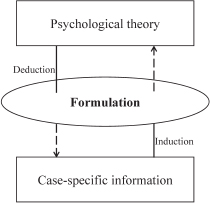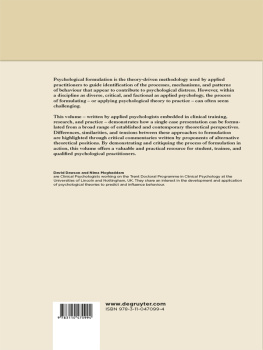
David L Dawson & Nima G Moghaddam
Formulation in Action. Applying Psychological Theory to Clinical Practice

Published by De Gruyter Open Ltd, Warsaw/Berlin

This work is licensed under the Creative Commons Attribution-NonCommercial-NoDerivs 3.0 license, which means that the text may be used for non-commercial purposes, provided credit is given to the author. For details go to http://creativecommons.org/licenses/by-nc-nd/3.0/.
2015 David L Dawson & Nima G Moghaddam and chapters contributors
ISBN: 978-3-11-047099-4
e-ISBN: 978-3-11-047101-4
Bibliographic information published by the Deutsche Nationalbibliothek.
The Deutsche Nationalbibliothek lists this publication in the Deutsche Nationalbibliografie; detailed bibliographic data are available in the Internet at http://dnb.dnb.de.
Managing Editor: Aneta Przepirka
www.degruyteropen.com
Cover illustration: YasnaTen
List of contributing authors
David L Dawson
University of Lincoln, UK
Nima G Moghaddam
University of Lincoln, UK
Ray St Ledger
Humber NHS Foundation Trust, UK
David M Gresswell
University of Lincoln, UK
Aidan J P Hart
University of Lincoln, UK
Kerry Beckley
Lincolnshire Partnership NHS Foundation Trust, UK
Thomas Schrder
The University of Nottingham, UK
Angela Cooper
The Centre for Emotions and Health, Canada
Rohan Naidoo
Compass Wellbeing, UK
Anna Tickle
The University of Nottingham / Nottinghamshire Healthcare NHS Foundation Trust, UK
Michael Rennoldson
Nottingham Trent University, UK
Rachel Sabin-Farrell
The University of Nottingham / Nottinghamshire Healthcare NHS Foundation Trust, UK
Roger Bretherton
University of Lincoln, UK
Vanessa Dale-Hewitt
The University of Nottingham, UK
Chris Irons
The Compassionate Mind Foundation, UK
Louise Braham
The University of Nottingham / Nottinghamshire Healthcare NHS Foundation Trust, UK
Sharron Smith
University of Lincoln, UK
Danielle De Boos
The University of Nottingham, UK
Acknowledgments
We would like to thank the contributors for their engagement with the project and for offering up their clinical work for critical evaluation. Special thanks to MG and Amou Meherdad for their influence over the years.
David L Dawson & Nima G Moghaddam
1 Formulation in Action: An Introduction
Every individual experiences a complex array of events, situations, and circumstances within their lifetime that influence their psychological development and sense of personhood. Previous relationships and attachments, social roles and expectations, formative experiences and contexts, education, gender, culture, and countless other factors influence how we perceive ourselves, the world, and those around us. The nexus between our personal characteristics and experiences is where our individuality and relationality lie, and from a psychological perspective our preferences, biases, behaviours, peccadillos, hopes, and fears are forged within this complex milieu.
Psychological formulation (and its derivatives: case formulation and case conceptualisation) is the dynamic framework used by many psychological practitioners, in a range of applied contexts, to manage and understand this complexity. While operational definitions vary subtly between different theoretical approaches, formulation in mental health settings can be broadly understood as the process and product of applying psychological theory and concepts to understand the aetiology, meaning, and maintenance of the psychological difficulties we, and others, experience, and to identify ways in which these difficulties may be managed (see , for a comprehensive overview of definitions).
When individuals seek psychological support, formulation helps to guide identification of the processes, mechanisms, patterns, and so forth that appear to be contributing to the individuals difficulties, assisting the psychological practitioner and the individuals they are engaged with to look through the complexity in order to recognise the latent factors and processes that appear key to understanding the distress and its maintenance. In this way, formulation can be thought of as the process of looking past the ripples and waves in order to understand the underlying currents and how best to navigate or harness them. Formulation is therefore considered central to the role of many applied psychological practitioners (e.g., ).

Figure 1.1: In principle, formulation is constructed, validated, and adjusted through ongoing processes of deduction (drawing from, and applying, theory) and induction (grounded in data). Dashed lines indicate that theory informs assessment of case-specific information, and case information informs how theory is applied. Through case-based abstractions, case information also has potential to inform theory-building. While the above represents an idealised model of the reciprocal relationship between theory and practice, idiographic practitioner factors (e.g., experience, biases, etc.) are likely to influence how theory is deduced and applied in practice
The theoretical landscape that underpins applied psychology and therapy is constantly developing and evolving, informed by advances in basic theory, clinical observation, research, data, politics, and fashion; and individual practitioners are trained and embed their practice within different theoretical schools, traditions, and models. The process of formulating, or applying theory to practice within a discipline as diverse, critical, and factional as applied psychology can therefore often seem unclear particularly to students and trainees who are developing their own competencies in this area and who might be anxious to ensure that they apply the right theory correctly. It is this process of applying psychological theory to clinical practice that is the central interest of the current volume.
The current volume has a strong applied focus and aims to demonstrate how a single case presentation (Molly described in ) can be formulated from a variety of theoretical perspectives. A single case description cannot capture the complexity, diversity, and dynamic processes of real-word clinical practice. However, by conveying multiple conceptualisations of a single client presentation, the salient features and unique aspects of each particular approach become more apparent thus facilitating direct comparison and contrast between applied approaches. In this way, we wanted chapter contributors to illustrate how they apply psychological theory to their clinical practice, and to show their working out highlighting their initial thoughts and hypotheses, the case factors they consider salient and why, and how these issues sit within their approach demonstrating formulation in action.
), we also wanted to stimulate a critical dialogue between psychological practitioners of different theoretical positions. In this way, we aimed to further augment the compare-and-contrast function of each chapter, but also to demonstrate that all psychological formulations are open to critique that the process of focussing on specific, theory-aligned factors within a case will inevitably entail the holding or over-looking of others and to evince the multiple perspectives that practitioners have and how these can be debated.
Next page














